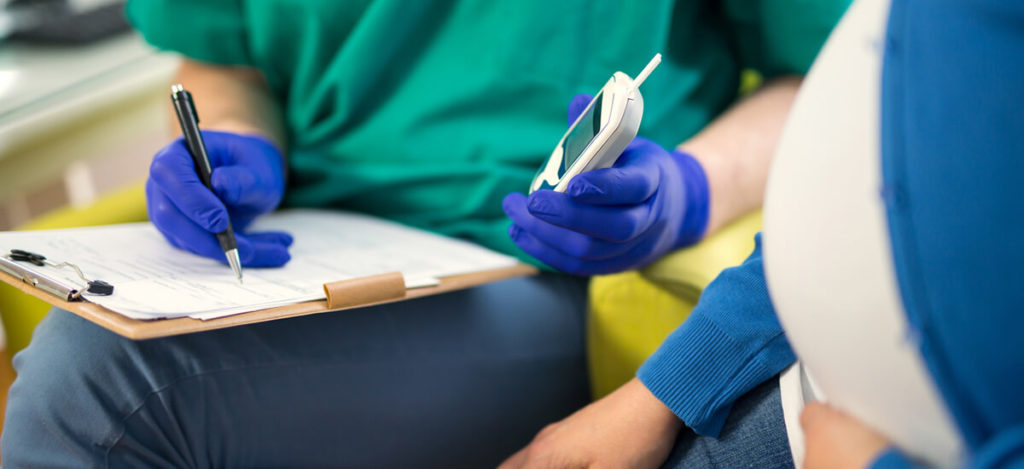This study will determine the safety and activity of a new formulation of thyrotropin-releasing hormone (TRH), a drug used for diagnosing and evaluating patients with certain thyroid gland abnormalities. Normal thyroid gland function depends on proper chemical signaling between the thyroid gland, the hypothalamus (the part of the brain where TRH is made), and the pituitary (another part of the brain). The TRH test helps assess this interaction. Production of the only FDA-approved preparation of TRH was stopped in July 2002. As a result, to have a continuous source of TRH available for NIH clinical and research purposes, the NIH Clinical Center (CC) Pharmacy Department produced a pharmaceutical grade formulation of TRH for patient use. This study will test the CC formulation in healthy volunteers to show that its activity and side effects are similar to those of the previously available commercial test preparation. It will then be studied in CC patients for whom the diagnostic test is recommended.
Healthy volunteers between 18 and 65 years of age and all patients requiring TRH evaluation of hypothalamic-pituitary-thyroid gland interaction may be eligible for this study. Patients include those with pituitary reserve, inconsistent thyroid function test, inappropriate TSH secretion, or pre- and post-operative evaluation of pituitary tumors. Normal volunteers will be screened with a medical history, physical examination, and blood tests. Women of child-bearing potential will be given a pregnancy test; pregnant and breast-feeding women may not participate.
The TRH test procedure will be the same for healthy volunteers and patients. All participants fast from midnight before the morning of the test. In the morning, a catheter (flexible plastic tube) is inserted into an arm vein for easy injection of the TRH and collection of blood samples. Blood pressure is monitored before and during the test. A blood sample is drawn, and then TRH is given through the catheter over a 1-minute period. Another nine blood samples are collected over a 3-hour period from the time of the TRH injection for measuring levels of various hormones. A total of less than 4 tablespoons of blood is taken for the test.
Official Title
Study of Thyrotropin Releasing Hormone in Normal Volunteers and in Patients with Thyroid or Pituitary Abnormalities
Conditions
– Healthy- Pituitary Disease- Thyroid Disease
Study Type
Interventional
Study Design
Treatment, Safety/Efficacy
Further Details
Thyrotropin releasing hormone (TRH) is a neuropeptide used in the diagnostic evaluation of patient with dysfunction of the hypothalamic-pituitary-thyroid (HPT) axis. In healthy individuals, administration of TRH intravenously results in pituitary secretion of thyrotropin [thyroid-stimulation hormone (TSH)], which in turn stimulates the thyroid gland release of thyroid hormones; thyroxine (T4) and triiodothyronine (T3). TRH stimulates the secretion of other pituitary hormones under normal physiologic as well as pathologic conditions. The purpose of this study is to test the safety and activity of a new preparation of TRH produced by the Pharmaceutical Development Section of the Clinical Center Pharmacy at the NIH. This preparation is similar to a previously commercially available preparation. Normal, health adults will be recruited to undergo a standard TRH test using the new preparation. TSH, prolactin and thyroid hormones are measured after the administration of TRH. After the safety, activity and diagnostic comparability are established, the preparation will be used for routine diagnostic testing and research studies in adults and children.
Study Start
February 6, 2003
Eligibility & Criteria
INCLUSION CRITERIA:Healthy Volunteer Study:1. Healthy males and females between the ages of 18 and 65 years.Diagnostic Study Protocol:1. All adults and children requiring dynamic testing of the hypothalamic-pituitary axis for the evaluation of pituitary reserve, inconsistent thyroid function test, inappropriate TSH secretion, or pre- and post-operative evaluation of pituitary adenomas (glycoprotein hormone secreting tumors, growth hormone secreting tumors and TSH secreting tumors).EXCLUSION CRITERIA:Healthy Volunteer Study:1. Hypertension;2. Coronary artery disease;3. History of asthma;4. History of seizures;5. Chronic liver, kidney, thyroid or pituitary disease;6. Use of medications for chronic conditions, contraception or hormone replacement;7. Pregnancy;8. Known allergy to TRH.Diagnostic Study Protocol:1. Uncontrolled hypertension;2. Uncontrolled seizure disorder;3. Unstable coronary disease;4. Known allergy to TRH.Research Protocols:1. Untreated hypertension;2. Coronary artery disease;3. History of asthma;4. History fo seizures5. Pregnancy;6. Known allergy to TRH.
Total Enrolment
99999
Contact Details
National Institute of Diabetes and Digestive and Kidney Diseases (NIDDK), 9000 Rockville Pike, Bethesda, Maryland, 20892, United States; Recruiting Patient Recruitment and Public Liaison Office 1-800-411-1222 prpl@mail.cc.nih.gov TTY 1-866-411-1010
All content and media on the HealthEngine Blog is created and published online for informational purposes only. It is not intended to be a substitute for professional medical advice and should not be relied on as health or personal advice. Always seek the guidance of your doctor or other qualified health professional with any questions you may have regarding your health or a medical condition. Never disregard the advice of a medical professional, or delay in seeking it because of something you have read on this Website. If you think you may have a medical emergency, call your doctor, go to the nearest hospital emergency department, or call the emergency services immediately.







